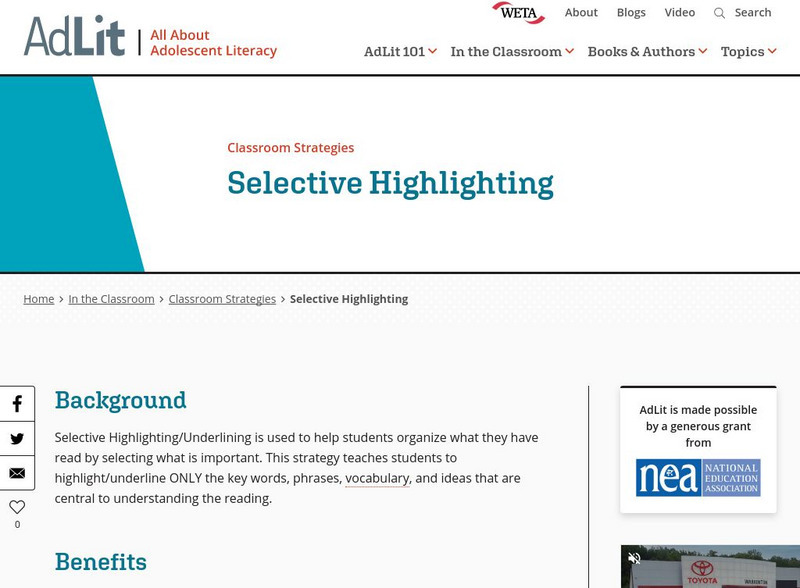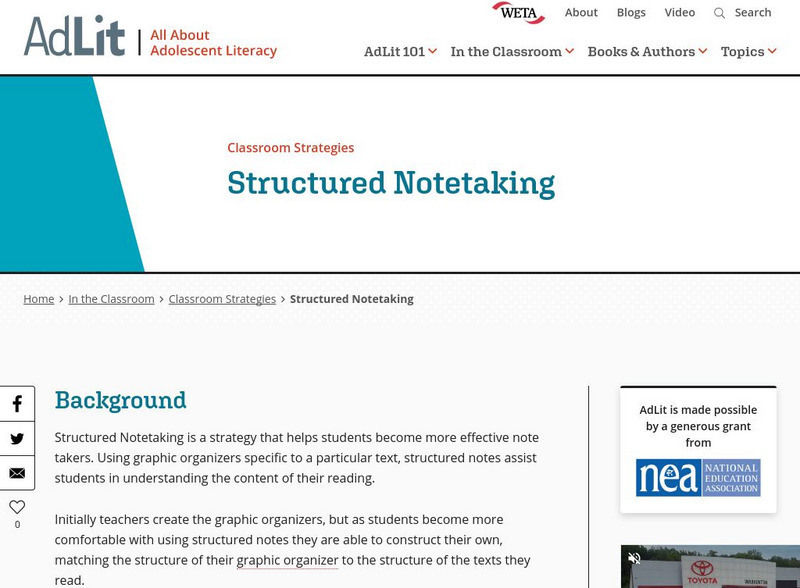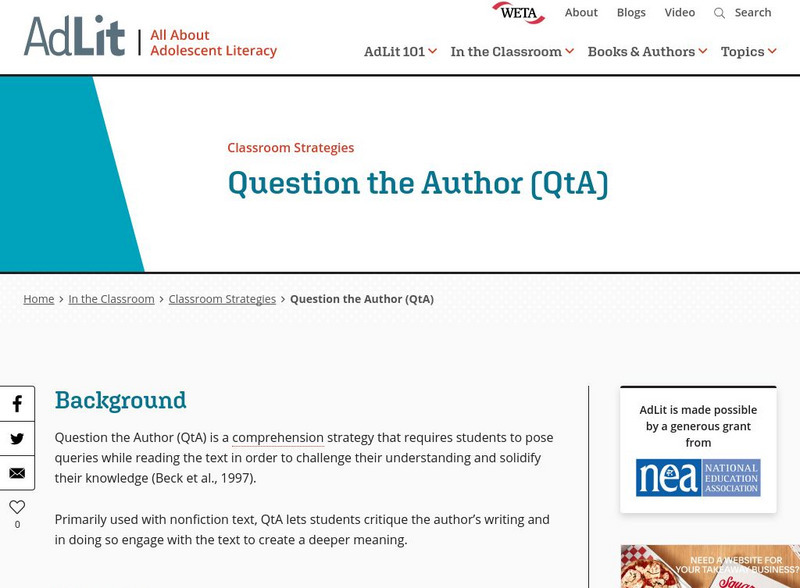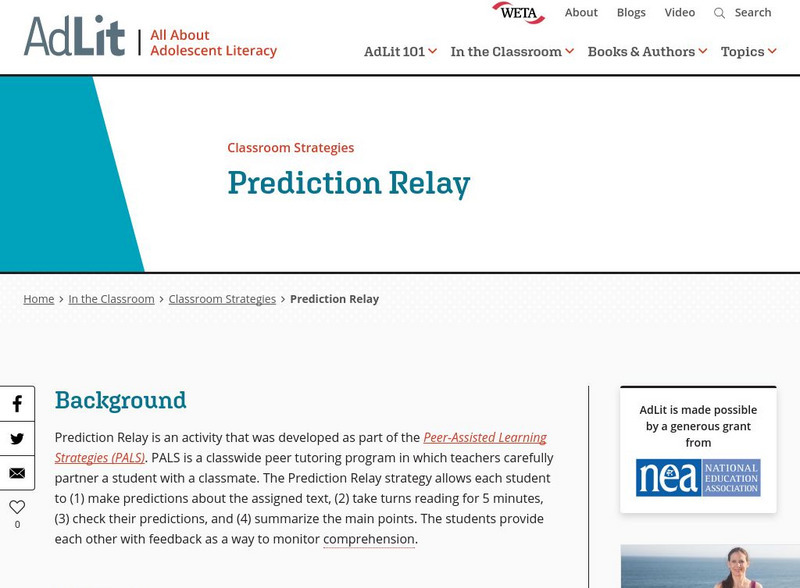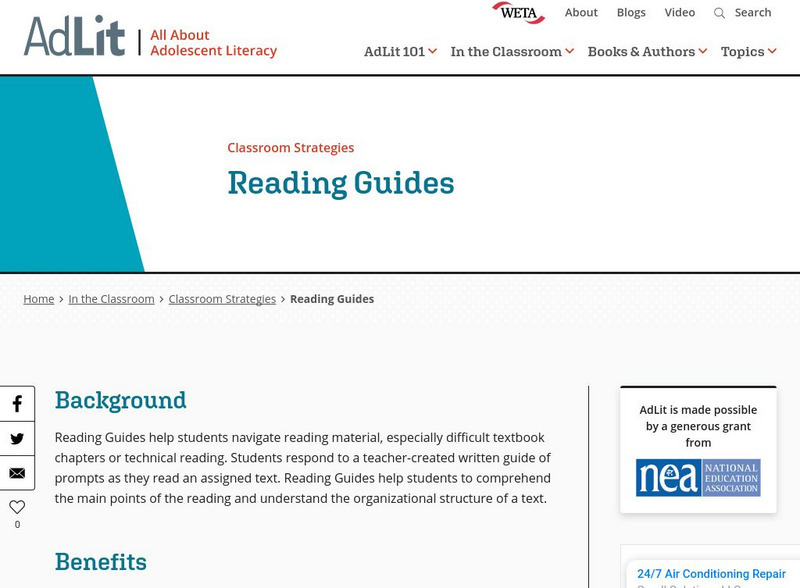AdLit
Ad lit.org: Classroom Strategies: Reciprocal Teaching
Reciprocal Teaching is a strategy that asks students and teachers to share the role of teacher by allowing both to lead the discussion about a given reading. Reciprocal Teaching involves four strategies that guide the discussion:...
AdLit
Ad lit.org: Classroom Strategies: Selective Highlighting
Selective Highlighting/Underlining is used to help students organize what they have read by selecting what is important. This strategy teaches students to highlight/underline ONLY the key words, phrases, vocabulary, and ideas that are...
AdLit
Ad lit.org: Classroom Strategies: Semantic Feature Analysis
The Semantic Feature Analysis strategy engages students in reading assignments by asking them to relate selected vocabulary to key features of the text. This technique uses a matrix to help students discover how one set of things is...
AdLit
Ad lit.org: Classroom Strategies: Story Maps
Story Maps are used for teaching students to work with story structure for better comprehension. This technique uses visual representations to help students organize important elements of a story. Students learn to summarize the main...
AdLit
Ad lit.org: Classroom Strategies: Structured Notetaking
Structured Notetaking is a strategy that helps students become more effective note takers. Using graphic organizers specific to a particular text, structured notes assist students in understanding the content of their reading.
AdLit
Ad lit.org: Classroom Strategies: Sq3 R: Survey Question Read Recite Review
SQ3R is a comprehension strategy that helps students think about the text they are reading while they're reading. Often categorized as a study strategy, SQ3R helps students "get it" the first time they read a text by teaching students...
AdLit
Ad lit.org: Classroom Strategies: Word Hunts
Word Hunts are used to enhance students' vocabulary growth. Teachers ask students to look for words and patterns in reading materials based upon selected features. Word Hunts focus on the structure and meaning of words by turning...
AdLit
Ad lit.org: Classroom Strategies: Question the Author (Qt A)
Question the Author (QtA) is a comprehension strategy that requires students to pose queries while reading the text in order to challenge their understanding and solidify their knowledge (Beck et al., 1997).
AdLit
Ad lit.org: Classroom Strategies: Question Answer Relationship (Qar)
Question-Answer relationship (QAR) is a strategy to be used after students have read. QAR teaches students how to decipher what types of questions they are being asked and where to find the answers to them. Four types of questions are...
AdLit
Ad lit.org: Classroom Strategies: Raft Writing
RAFT is a writing strategy that helps students understand their role as a writer, the audience they will address, the varied formats for writing, and the topic they'll be writing about. By using this strategy, teachers encourage students...
AdLit
Ad lit.org: Classroom Strategies: Summarizing
Summarizing teaches students how to take a large selection of text and reduce it to the main points for a more concise understanding. Upon reading a passage, summarizing helps students learn to determine essential ideas and consolidate...
AdLit
Ad lit.org: Classroom Strategies: Seed Discussion
A Seed Discussion is a two-part strategy used to teach students how to engage in discussions about assigned readings. In the first part, students read selected text and identify "seeds" or key concepts of a passage which may need...
AdLit
Ad lit.org: Classroom Strategies: Prediction Relay
Prediction Relay is an activity that was developed as part of the Peer-Assisted Learning Strategies (PALS). PALS is a classwide peer tutoring program in which teachers carefully partner a student with a classmate. The Prediction Relay...
AdLit
Ad lit.org: Classroom Strategies: Reading Guides
Reading Guides help students navigate reading material, especially difficult textbook chapters or technical reading. Students respond to a teacher-created written guide of prompts as they read an assigned text. Reading Guides help...

